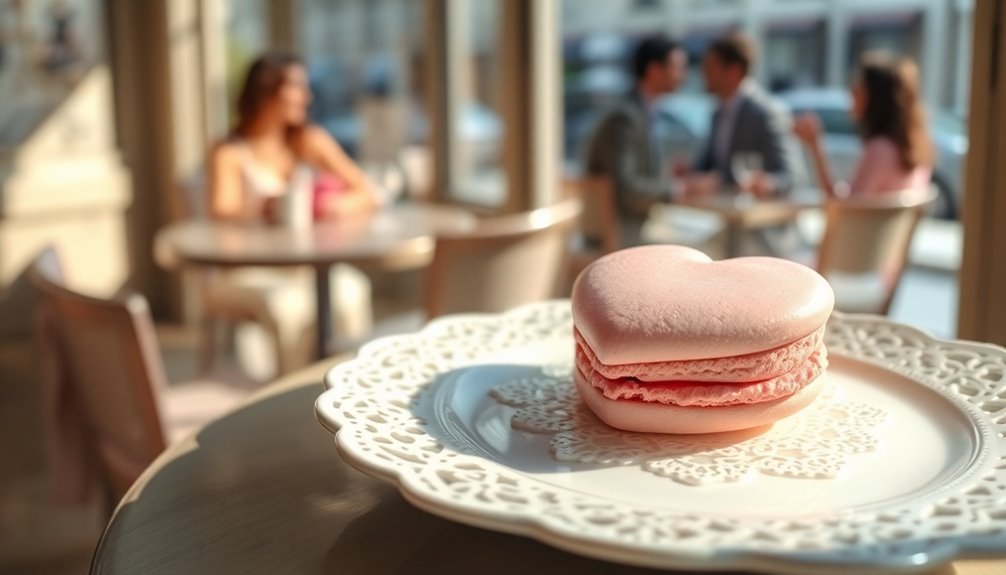To say "I love you" in French, you simply say "Je t'aime." This phrase carries deep romantic significance and is best reserved for special relationships. If you want to express fondness without heavy sentiment, you can say "Je t'aime bien," which means "I like you." Other phrases, like "Je t'adore" (I adore you) and "Je t'aimerai toujours" (I will always love you), add variety to your declarations. Remember, context matters when expressing love in French, so use these terms at appropriate moments. There's much more to explore about love expressions, so keep going to learn additional phrases and tips!
Key Takeaways
- "Je t'aime" is the direct translation of "I love you" in French, used romantically with partners.
- For less intense feelings, say "Je t'aime bien," meaning "I like you," suitable for friends.
- "Je t'adore" expresses adoration, ideal for a closer bond between friends and partners.
- To emphasize lasting love, use "Je t'aimerai toujours," meaning "I will always love you."
- Practice pronunciation by saying "zhuh tem" to ensure clarity and connection in your expression.
Basic French Love Expressions

When it comes to expressing your feelings in French, knowing a few key phrases can make all the difference. If you want to say "I love you" romantically, use "Je t'aime."
For a lighter touch, "Je t'aime bien" is perfect among friends, meaning "I like you." If you're feeling more affectionate but not overly romantic, try "Je t'adore," which translates to "I adore you."
To show a deeper commitment, you might say, "Je t'aimerai toujours," meaning "I will always love you."
And for a fun, casual vibe, especially among younger speakers, you can say "Je te kiffe," which means "I really like you."
These phrases will definitely help you express affection effectively!
Terms of Endearment in French

Terms of endearment in French add a sweet touch to relationships, showcasing affection and intimacy in unique ways. When you want to express love, you might call someone mon amour or ma chérie for a feminine touch.
If you're feeling playful, try ma puce, which adds a cute flair. For deeper affection, mon trésor conveys how much someone means to you. Doudou is another term that captures warmth and familiarity.
Each of these termes d'affection serves as a lovely déclaration d'amour. When you say je t'adore, it perfectly complements these expressions, reinforcing your feelings.
Using these terms can strengthen your bond, making your connections even more special.
Romantic Contexts for Expressions

In romantic relationships, knowing when to express your feelings can deepen your connection considerably. The phrase "Je t'aime" is a powerful declaration of love, typically reserved for partners. It carries significant emotional weight in French culture.
Understanding the right moment for this expression is essential; using it too soon can shift dynamics unexpectedly. In more casual contexts, you might use "Je t'adore" or "Je t'aime bien" to convey affection without romantic implications.
For long-term commitment, phrases like "Je t'aimerai toujours" or "Je veux passer ma vie avec toi" showcase deeper devotion. Remember, the cultural significance of love expressions means many wait weeks or months before feeling ready to say "I love you."
Timing is everything in these romantic contexts.
Creative Ways to Say Love

When it comes to expressing love in French, you've got plenty of creative options beyond just "Je t'aime."
Whether you want to convey deep affection with phrases like "Mon cœur est à toi" or keep it light with "Je pense à toi," these expressions can add flair to your declarations.
Understanding the right context will help you choose the perfect phrase for any relationship.
Romantic French Phrases
Expressing love in French goes beyond just saying "Je t'aime." There are countless romantic phrases that can add depth and creativity to your declarations of affection.
Consider these options:
- "Je t'adore" – I adore you.
- "Je suis amoureux/amoureuse de toi" – I'm in love with you.
- "Tu es ma raison d'être" – You're my reason for being.
For playful moments, you might say, "Je te kiffe" (I have a crush on you) or "Je pense à toi" (I'm thinking of you), perfect for early stages of affection.
And if you're looking to convey lasting commitment, "Je t'aimerai toujours" (I will always love you) is ideal. Each phrase uniquely expresses your feelings!
Light-hearted Expressions of Affection
Finding creative ways to say "I love you" can bring a delightful spark to your relationship. Light-hearted expressions of affection like "Je t'apprécie beaucoup" and "Je pense à toi" are perfect for early stages, conveying warmth without pressure.
If you want to keep it fun, try "Je te kiffe," a relaxed way to express your budding feelings. Compliments like "Tu es trop mignon(ne)" add a playful touch that keeps things light.
When you miss someone, saying "Tu me manques" maintains that affectionate tone while expressing longing. Incorporating playful gestures, such as ending messages with "Bisous," enhances your flirty vibe, showing you care in charming ways.
These expressions of affection can truly brighten your connection! Additionally, poetry often serves as a powerful medium for emotional expression, allowing you to convey deeper feelings in a creative manner.
Cultural Significance of "Je T'aime"

The phrase "Je t'aime" carries significant cultural weight in French society, signifying a deep emotional bond that goes beyond casual affection. Understanding its importance can help you navigate romantic relationships effectively.
Here are three key points to reflect on:
- Serious Declaration: "Je t'aime" is reserved for meaningful connections, often expressed only after months of emotional bonding.
- Nuanced Language: Variations like "Je t'adore" or "Je t'aime bien" allow you to express affection without implying deep romantic commitment.
- Avoiding Misunderstandings: Misusing "Je t'aime" can lead to confusion, highlighting the necessity of grasping relationship dynamics before declaring love.
Flirty French Phrases

Flirting in French can be an enchanting experience, filled with playful phrases that convey interest and attraction.
To express your love in a light-hearted way, try saying, "Je t'apprécie beaucoup," which shows you really like someone without the weight of a commitment.
If you want to turn up the charm, use "Tu me fais craquer," a flirty expression that indicates you find them irresistible.
Compliment them by saying, "Tu es charmant" or "Tu es charmante," which can spark romantic interest.
Finally, suggest a date with "On devrait se voir bientôt," signaling your desire to spend time together.
Knowing how to say these phrases can transform your romantic experience into something truly memorable!
Expressions for Missing Someone

When you're missing someone, expressing those feelings in French can be both heartfelt and meaningful.
Phrases like "Tu me manques" truly capture the emotional impact of absence.
Let's explore some common expressions that help you convey just how much someone means to you when they're away.
Common Phrases for Missing
Missing someone can be tough, especially when you want to express those feelings in a meaningful way. Here are some common phrases you can use to convey your sentiments:
- "Tu me manques" – This translates to "I miss you" and is a heartfelt way to express longing.
- "J'ai hâte de te revoir" – Use this to say "I can't wait to see you again," showcasing your enthusiasm for reunion.
- "Tu me manques beaucoup" – This means "I miss you a lot," perfect for emphasizing your emotional connection.
These expressions not only reflect your affection but also strengthen your relation.
Whether it's a friend or a romantic partner, using these phrases will help you express your amour in a sentimental way. Je t'aime!
Emotional Impact of Absence**
The emotional impact of absence can weigh heavily on your heart, especially when you're separated from someone you care about. In French, "Tu me manques" conveys your feelings of longing, literally meaning "You me miss." Using phrases like "Est-ce que je te manque?" invites dialogue about these deep emotional connections.
Here's a quick reference of expressions for missing someone:
| French Phrase | English Translation |
|---|---|
| Tu me manques | I miss you |
| J'ai hâte de te revoir | I can't wait to see you |
| Tu me manques beaucoup | I miss you a lot |
| Je t'aime | I love you |
| Est-ce que je te manque? | Do you miss me? |
These expressions of absence highlight the depth of your feelings and love in French. Remember, sharing Romantic Love Shayari can also help convey your emotions beautifully during these times of longing.
Hugs and Kisses in French

Hugs and kisses play a significant role in expressing affection in French culture. When you want to convey warmth and closeness, you can use these terms:
- Bisous: A casual way to say "kisses," perfect for goodbyes or notes.
- Je t'embrasse: This means "I hug (embrace) you," a lovely farewell.
- Gros bisous: This translates to "large kiss," indicating deeper affection.
You might also hear bises among friends and family, showcasing the informal nature of these expressions.
The verb embrasser captures the essence of hugs and kisses, emphasizing physical affection.
Pronunciation Tips for Love Phrases

Getting the pronunciation right for love phrases in French is essential, especially for "Je t'aime," which sounds like "zhuh tem."
To improve, try using audio resources or working with a tutor to hear and practice the correct sounds. Regular repetition will help you express your feelings more fluently and confidently.
Importance of Correct Pronunciation
When you express love in French, getting the pronunciation right can make all the difference in how your feelings are received. To master phrases like "Je t'aime" (zhuh tem), focus on these key aspects:
- Correct Pronunciation: Use pronunciation guides to understand the sounds accurately.
- Engage with Native Speakers: Practice with native speakers through language exchange platforms to grasp tonal nuances.
- Understand Phonetics: Familiarize yourself with French phonetics to avoid common pronunciation mistakes.
Regular practice and repetition will boost your confidence and fluency.
Practice Techniques for Fluency
Mastering pronunciation is just the beginning; practice techniques play a significant role in achieving fluency, especially for romantic phrases.
Focus on the phonetics of commonly used French phrases like "Je t'aime," pronounced as "zhuh tem." Utilize online resources, such as YouTube videos and language apps, to hear native speakers and mimic their intonation.
Repetition is essential—regularly practice phrases like "Je t'adore" and "Tu es mon amour" to solidify your pronunciation. Engage with French tutors for personalized feedback that helps correct mistakes and boosts your confidence.
Record yourself speaking to identify areas for improvement, ensuring your emotional expression aligns with the romantic message you want to convey.
These techniques make language learning both effective and enjoyable.
Committing With Romantic Language

Expressing commitment in a relationship often requires more than just saying "I love you."
By incorporating romantic phrases like "Je t'aimerai toujours" or "Je veux passer ma vie avec toi," you can convey a deeper emotional connection.
Here are three powerful phrases to express your feelings:
- "Je t'aime pour toujours" – This means "I love you forever," emphasizing your lasting love.
- "Tu es ma raison d'être" – This translates to "You are my reason for being," showcasing deep devotion.
- "Je veux passer ma vie avec toi" – This signals your commitment to a long-term relationship.
Using these expressions not only reinforces commitment but also enriches your romantic love.
Embrace them to show your partner just how significant they're to you.
Frequently Asked Questions
How Do French People Say "I Love You"?
When you ask how French people say "I love you," they typically say "Je t'aime." This phrase holds deep emotional significance, usually meant for serious romantic relationships.
If you want to reciprocate, you'd say "Je t'aime aussi." For lighter affection, "Je t'aime bien" expresses a friendly liking.
Among younger folks, "Je te kiffe" shows infatuation. Understanding these nuances will help you navigate love and affection in French culture more effectively.
How Do I Reply "I Love You"?
When someone tells you they love you, your response can vary based on your feelings.
If you feel the same, you might say, "I love you too" or "I adore you."
If you're touched but not ready to reciprocate, saying, "That touches me" keeps the conversation light.
If you're unsure, "That's sweet" shows appreciation without pressure.
Just be sincere, as your response can strengthen the bond between you both.
How Do You Express Your Love in French?
Imagine standing under a starlit sky, heart racing as you want to express your feelings. In French, you'd simply say, "Je t'aime," and let those words wrap around your loved one like a warm embrace.
For lighter moments, you might opt for "Je t'aime bien," showing affection without the weight of romance.
As your bond deepens, phrases like "Je t'aimerai toujours" can truly capture the essence of your commitment and devotion.
How Do You Confess Your Love in French?
When you confess your love in French, you'll want to use heartfelt phrases.
Start with "Je t'aime," for a classic declaration. If you feel more passionate, say, "Je suis amoureux/amoureuse de toi."
For a lasting commitment, try "Je t'aimerai toujours." If you're feeling playful, "Je te kiffe" works well among younger crowds.
And if someone shares their feelings, don't forget to respond with "Je t'aime aussi" to show your love is mutual.
Conclusion
Now that you've got the basics down, you're ready to express your feelings in French! Did you know that "Je t'aime" is uttered nearly 100 million times a day worldwide? That's a lot of love! Whether you're whispering sweet nothings or sending a heartfelt message, using these phrases will deepen your connection. So go ahead, embrace the romance of the French language, and let your loved ones know just how much they mean to you!








